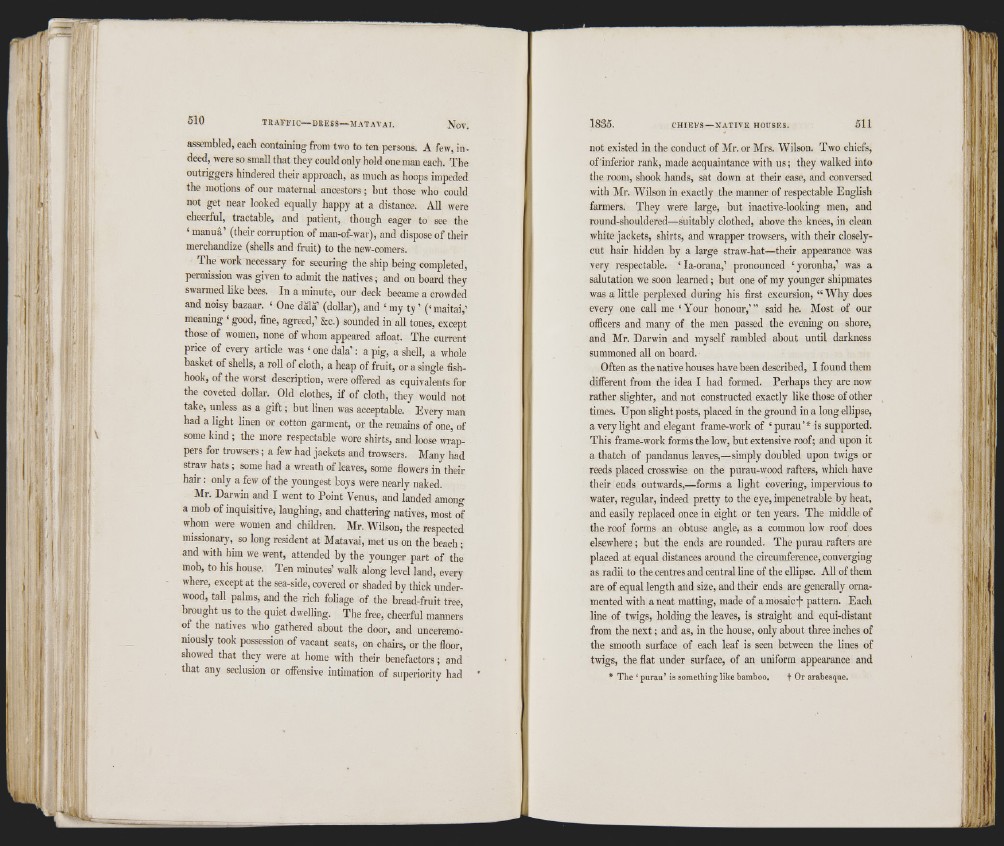
' J
/ ’ y
i
f : t
VhíT
i ' m - -
'TM í
! f
TRAFFIC— DRESS— MATAVAI. Nov.
assembled, each containing from two to ten persons. A few, indeed,
were so small that they could only hold one man each. The
outriggers hindered their tipproach, as much as hoops impeded
the motions of our maternal ancestors ; but those who could
not get near looked equally happy at a distance. All were
cheerful, tractable, and patient, though eager to see the
‘ manua’ (their corruption of man-of-war), and dispose of their
merchandize (shells and fruit) to the new-comers.
The work necessary for securing the ship being completed,
permission was given to admit the natives; and on hoard they
swarmed hke bees. In a minute, our deck became a crowded
and noisy bazaar. ‘ One dala’ (dollar), and ‘ my ty ’ (‘maitai,’
meaning ‘ good, fine, agreed,’ &c.) sounded in all tones, except
those of women, none of whom appeared afioat. The current
price of every article was ‘ one dala’ : a pig, a shell, a whole
basket of shells, a roll of cloth, a heap of fruit, or a single fishhook,
of the worst description, were offered as equivalents for
the coveted dollar. Old clothes, if of cloth, they would not
take, unless as a g ift; but linen was acceptable. Every man
had a light hnen or cotton garment, or the remains of one, of
some kind ; the more respectable wore shirts, and loose wrappers
for trowsers ; a few had jackets and trowsers. Many had
straw hats ; some had a wreath of leaves, some flowers in their
hair : only a few of the youngest hoys were nearly naked.
Mr. Darwin and I went to Point Venus, and landed among
a mob of inquisitive, laughing, and chattering natives, most o7
whom were women and children. Mr. Wilson, the respected
missionary, so long resident at Matavai, met us on the beach ;
and with him we went, attended hy the younger part of tlT
mob, to his house. Ten minutes’ walk along level land, every
where, except at the sea-side, covered or shaded by thick underwood,
tall palms, and the rich foliage of the bread-fruit tree,
brought us to the quiet dwelling. The free, cheerful mannerj
of the natives who gathered about the door, and unceremoniously
took possession of vacant seats, on chairs, or the floor,
showed that they were at home with their benefactors; and
that any seclusion or offensive intimation of superiority had
not existed in the conduct of Mr. or Mrs. Wilson. T wo chiefs,
of inferior rank, made acquaintance with u s; they walked into
the room, shook hands, sat down at their ease, and conversed
with Mr. Wilson in exactly the manner of respectable English
farmers. They were large, hut inactive-looking men, and
round-shouldered—suitably clothed, above the knees, in clean
white jackets, shirts, and wrapper trowsers, with their closely-
cut hair hidden by a large straw-hat—their appearance was
very respectable. ‘ la-orana,’ pronounced ‘ yoronha,’ was a
salutation we soon learned; hut one of my younger shipmates
was a little perplexed during his first excursion, “ Why does
every one call me ‘Your honour,’ ” said he. Most of our
officers and many of the men passed the evening on shore,
and Mr. Darwin and myself rambled about until darkness
summoned all on board.
Often as the native houses have been described, I found them
different from the idea I had formed. Perhaps they are now
rather slighter, and not constructed exactly like those of other
times. Upon slight posts, placed in the ground in a long ellipse,
a very light and elegant frame-work of ‘ purau’* is supported.
This frame-work forms the low, but extensive roof; and upon it
a thatch of pandanus leaves,—simply doubled upon twigs or
reeds placed crosswise on the purau-wood rafters, which have
their ends outwards,—forms a light covering, impervious to
water, regular, indeed pretty to the eye, impenetrable by heat,
and easily replaced once in eight or ten years. The middle of
the roof forms an obtuse angle, as a common low roof does
elsewhere ; but the ends are rounded. The purau rafters are
placed at equal distances around the circumference, converging
as radii to the centres and central line of the ellipse. All of them
are of equal length and size, and their ends are generally ornamented
with a neat matting, made of a mosaic# pattern. Each
line of twigs, holding the leaves, is straight and equi-distant
from the next; and as, in the house, only about tliree inches of
the smooth surface of each leaf is seen between the lines of
twigs, the flat under surface, of an uniform appearance and
* The ‘ purau’ is something like bamboo. t Or arabesque.
;:il
i j
¡ Í Y
IÍT
‘fl
■ i fL
f i